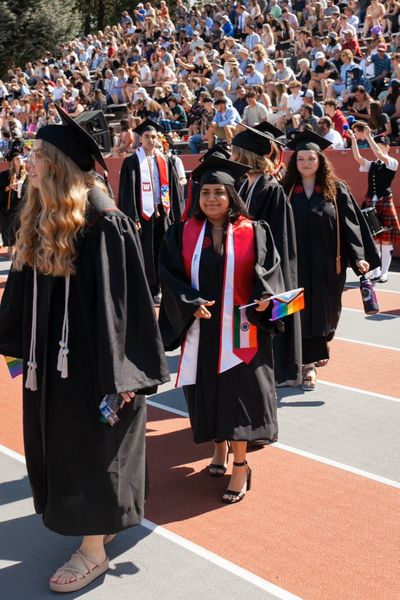Whitworth University adds sexual orientation to list of protected classes after year of campus protests

Whitworth University added sexual orientation to its list of protected classes Wednesday following more than a year of discussion and protests.
“The board voted yesterday to resolutely uphold the Christ-centered commitments required of Whitworth staff and faculty; safeguard the campus environment to allow for civil discourse on topics about which faithful Christians disagree, including God’s design for sexual expression; and add ‘sexual orientation’ to the university’s list of protected classes, which already includes color, gender, ethnicity, social or economic class, and nationality,” the university wrote in an email sent to students and employees Thursday morning.
The university did not respond to multiple requests for comment on the decision.
Immediately after receiving the email, Whitworth’s Pride Club posted a portion of it on its Instagram surrounded by pink and yellow flowers.
“Thank you to everyone who has been proactive and supportive of this change,” the club wrote. “It is truly amazing to see that our voices have been heard.”
In July , former professor Kathy Lee detailed her experience as the first openly gay professor at the university in a New Yorker profile. Her struggles drew criticism of the university’s lack of protections for LGBTQ+ faculty and staff.
Lee was surprised when she got a handful of texts from former students Thursday sharing the news.
“I’m kind of numb,” Lee said shortly after the decision. “I think I had been to the point where I was in the ‘I’ll believe it when I see it’ kind of place.”
Since Lee arrived at Whitworth in 2011, she has seen a huge change on campus in terms of accepting openly gay faculty and staff by hiring committees, something that is “to Whitworth’s credit.”
Making that change official policy is a step Lee hopes will encourage queer people thinking about applying to Whitworth.
“For faculty who are members of the LGBTQ community, I would hope that they could talk about their lives in a way that’s more open and that they feel more open about doing that,” Lee said.
After Lee became more open about her journey, 600 alumni signed a petition for the university to affirm the LGBTQ+ community.
A new round of petitions circulated across the campus in March, with the board of trustees yet to make a decision. The university also temporarily shut down a campus event called “Queer Church” before allowing it to continue with changes.
Students, including the group Signal Safe Space WU, continued to protest throughout the spring semester, writing messages in chalk on campus and circulating a zine advocating for LGBTQ+ acceptance. Dozens of students handed university President Scott McQuilkin pride flags at graduation.
Students advocating for a change said the board of trustees process for making a decision was unclear.
“There has been absolutely no communication with students about what the process is,” said Annaclare Splettstoeszer, co-creator of Signal Safe Space.
Whitworth explained more about the process in Thursday’s email.
The university began examining the question of adding “sexual orientation” to the list of protected classes in April 2022. At a special meeting in August of that year, the board appointed an advisory committee of eight trustees and three university employees.
The committee met weekly between September and January before discussing their work at the board of trustee’s January retreat and April meetings. The committee invited written input from faculty, staff and students, consulted employment attorneys, reviewed theological perspectives and studied similar processes at other Christian universities, according to the email.
The board had several special meetings since April, including on Wednesday, when it voted on the change.
Whitworth already had an established practice of providing equal opportunity for all people regardless of sexual orientation, the board said in the email. This decision just affirms that policy, they added.
The board was careful not to lay out a theological stance but instead encouraged the community to continue to respectfully discuss the issue.
“In this complexity, and through our decision, we are not settling the theological differences between faithful Christians who disagree on biblical positions related to sexual orientation and expression,” the email reads. “As fallen creatures, we must practice humility to guard against easy presumptions of certainty.”
Acknowledging the lack of certainty and variety of perspectives in Christianity have always been something Lee appreciated about Whitworth.
“I think people’s impression of Christianity right now is that they’re very judgy and certain that they have the truth,” Lee said. “And I think that statement does really express Whitworth’s attempt to occupy a place that says, ‘Hey, we don’t know it all.’ ”
The board also noted that it believes not all types of sexual expression are biblical.
“The board also agrees that not all manifestations of sexual expression are appropriate for a Christ-centered institution,” the email reads. “We affirm that God’s design for human flourishing is for sexual activity to be reserved for those in a committed and monogamous covenant relationship.”
The university did not immediately respond to questions asking for clarification on what that kind of relationship entails.
“I was surprised by that language,” Lee said. “I don’t know what that means.”
Whitworth is a member of the Council for Christian Colleges and Universities, which “defines and advocates for marriage between a man and a woman, as clearly stated in the Bible.”
Eastern University’s membership in the council was put on hold last year when it added sexual orientation to its list of protected classes, according to Inside Higher Ed.
It’s unclear whether Whitworth’s decision Wednesday will affect the university’s standing with the council.
The move is likely to get backlash, Lee acknowledged, noting it’s important for those who advocated for this change to share their elation.
“Sometimes I think the people who are angry are the ones who contact versus the ones who are happy,” Lee said. “I hope the people who applaud this decision also send emails to the institution.”